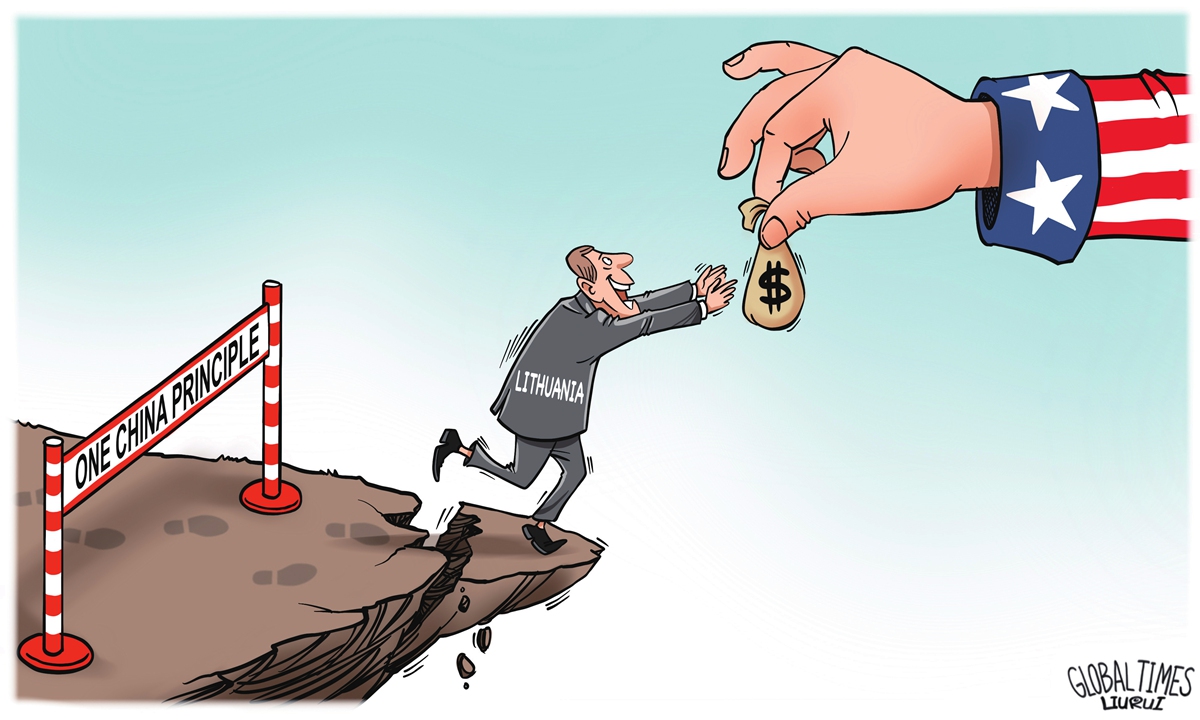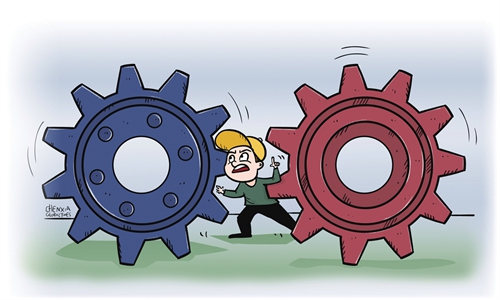
Gambling on crumbs from the US' table Illustration: Liu Rui/GT
Questions on whether China is prepared to end diplomatic ties with Lithuania have been swirling after China decided to downgrade the relations to the level of chargé d'affaires in a solemn protest against the Baltic state's blatant violation of the one-China principle.A Chinese Foreign Ministry spokesperson gave at Monday's routine press briefing a concise and clear message: it depends on whether Lithuania will continue going further down the wrong path, or correct its mistakes before it is too late.
"China's solemn position has been fully reflected in the decision. We will take all necessary measures to safeguard national sovereignty and territorial integrity and safeguard our core interests," Foreign Ministry spokesperson Zhao Lijian said.
In response to China's action, Lithuania's Foreign Ministry said in a statement on Sunday said that it "regrets" the decision and the country has "a right to expand cooperation with Taiwan, to accept and to establish non-diplomatic representations to ensure practical development of such ties," like in many other countries.
Zhao slammed such statement as being "chicanery," which showed that "the more it tries to hide, the more it is exposed," stressing that the so-called representative office bearing the name of Taiwan violates the one-China principle and creates an egregious precedent in the world.
Lithuania's argument is a shift of focus between "naming" and "carrying out actual activities," Cui Hongjian, director of the Department of European Studies at the China Institute of International Studies, told the Global Times on Monday.
The name "the Taiwanese Representative Office in Lithuania" itself undermines the one-China principle as it uses Taiwan. If Lithuania regards it as non-diplomatic representation, why does the country still insist on using Taiwan? Cui asked.
The answer is clear. This is Lithuania's sophistry and political maneuvering, Cui said.
Following China's decision, the European Commission said it does not regard the opening of a representative office from Taiwan in Lithuania as a breach of the EU's one-China policy.
"We have made clear in contacts with China and in public statements that this is predominantly a matter between China and Lithuania, but also since summer, the EU has stood by Lithuania in the face of sustained coercive measures from China," a spokesperson for the EU's Executive Commission said on Sunday.
Zhao said the remarks ignore the facts and clearly violate the commitment made by the EU to China in 1975 when China and the EU established diplomatic ties.
Christopher Soames, then vice-president of the Commission of the European Economic Community (EEC), visited China in 1975. It was during this visit that China and the EEC agreed to establish official relations. On the Taiwan question, Soames stated that "all the Member States of the Community recognized the government of China and had taken positions with regard to the Taiwan question acceptable to the People's Republic." He also confirmed, and I quote, that "the Community does not entertain any official relations with Taiwan or have any agreements with it."
"The EU should keep its word instead of reneging on it. We urge Lithuania and the EU to truly abide by the one-China principle and honor their political commitments on Taiwan-related matters with honest actions," Zhao said. "If someone thinks that Taiwan is a card that can be played easily and can be used to harm China's interests, they are completely miscalculating."
Cui noted that the EU's support for Lithuania is a continuation of what it has always done. The EU intends to blur the one-China principle and even attempts to seek an interpretation on the principle on its basis.
Referring to economic cooperation between the US and Lithuania this week, Cui pointed out that the US wants to amplify Lithuania's attitude to a Western response to China to help its image as a world leader.
"Accepting the dollar-diplomacy only exposes the reality that Lithuania is selling its diplomatic principles, which makes people wonder: Where is the so-called democratic appeal espoused by the US, Lithuania and the West?" Cui asked.
The expert pointed out that China should communicate with the EU, preventing other European countries or the EU to follow Lithuania's bad precedent, as the one-China principle is an important political foundation for mutual political trust between China and the EU and should not be shaken or challenged.




